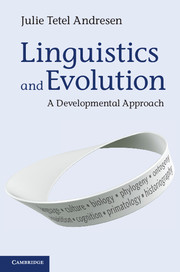Introduction - Historiography’s contribution to theoretical linguistics
Published online by Cambridge University Press: 05 June 2014
Summary
What is needed for a twenty-first-century linguistics is an understanding of language that is inspired not by Descartes but by Darwin. A linguistics inspired by Descartes is beautiful but static. A linguistics inspired by Darwin is messy and dynamic. A linguistics inspired by Descartes assumes that communication occurs and proceeds to explain how it occurs. A linguistics inspired by Darwin is motivated by the whys: why communication occurs, why a group has the particular language it has, why on any given occasion an individual says this or that or nothing at all. A linguistics inspired by Descartes abstracts linguistic universals away from time and space and lets them disappear into the mysteries of the genome. A linguistics inspired by Darwin tethers itself to whole bodies whose feet are on the ground and seeks to understand the possible relationship between brain development genes such as ASPM and Microcephalin and the degree of difficulty in learning a tonal language like Chinese or a non-tonal language like English. A linguistics inspired by Descartes operates in a framework where the terms nature and nurture function in familiar opposition, precludes investigation into the explanatory dimensions of both evolutionary time and an individual’s lifetime, and accommodates with difficulty micro-variables in the human genome. A linguistics inspired by Darwin dispels the conceptual chaos of the nature/nurture opposition and recasts explanations within the framework of a developmental system that has evolutionary stability.
- Type
- Chapter
- Information
- Linguistics and EvolutionA Developmental Approach, pp. 1 - 8Publisher: Cambridge University PressPrint publication year: 2013

